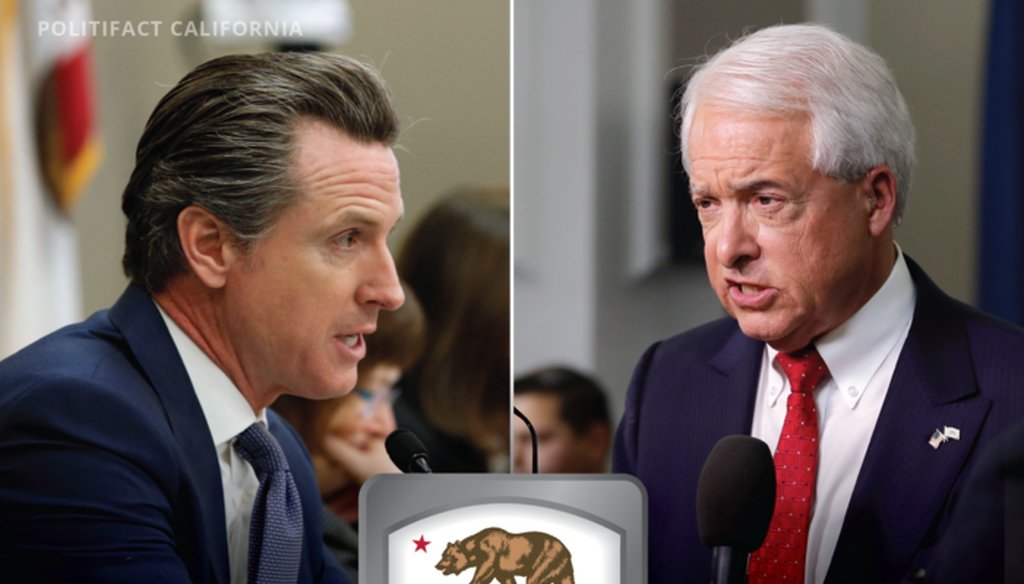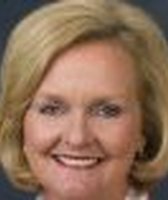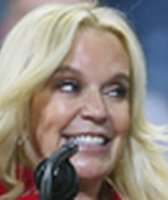Stand up for the facts!
Our only agenda is to publish the truth so you can be an informed participant in democracy.
We need your help.
I would like to contribute

Democrat Gavin Newsom and Republican John Cox are competing for California governor. Graphic by PolitiFact California.
Republican John Cox and Democrat Gavin Newsom met for their only debate in the California governor’s race, with the two candidates agreeing that they hold very different positions on a number of topics, including regulation and immigration.
In other cases, they agreed on the problems California faces -- a housing shortage, affordability for the middle class -- but they had very different policy ideas to address them.
Here is a summary of what the candidates said at the debate, including what was accurate and what was not. We'll be updating this story with more debate coverage as we complete it.
Click here to read this story in Spanish.
As he has on the campaign trail, Cox painted a picture of California losing its population due to housing costs, taxes and poor schools.
"The status quo isn’t working for average Californians. They can’t afford to live here and that’s why they’re leaving," Cox said, saying that the purpose of his campaign was to disrupt the status quo in Sacramento.
Later in the debate, Cox added, "Gavin wants to continue Gov. (Jerry) Brown’s management or even worse. The fact of the matter is that under Gov. Brown people are being further priced out of this state. They’re leaving this state in droves."
California’s once-rapid population growth has slowed in recent decades. More people have been leaving for other states than have been moving in for many years, according to a February 2018 study by the California Legislative Analyst’s Office.
About 5 million people moved to California from other states, while about 6 million left the state from 2007 to 2016, according to the LAO report, which cited data from the American Community Survey.
It’s important to note, though, that California’s overall population is not in decline. Just the opposite: It’s grown by an average 333,000 people per year since 2010 largely due to natural births and international migration.
California was home to 39.8 million people as of January 2018, according to the California Department of Finance. That included an increase of 309,000 residents in 2017 alone and nearly 2.3 million over seven years.
During the summer, Cox said that "fully half" of Californians want to leave the state. We found that number to be an exaggeration and rated the claim Half True.
Newsom said that Cox "is someone who believes very passionately in building the wall, he believes that sanctuary policy should be eliminated, he believes in the elimination, as he refers to it, of chain migration, which is nothing more than family reunification. He parrots, at almost every opportunity, Donald Trump, and Trump would have an advocate in Sacramento if he becomes the next governor."
Newsom is making Cox seem more in lockstep with Trump than he actually is. When Newsom made a similar claim in August, when he said Cox "parroted, parroted Trump — almost verbatim — on the children’s separation issues at the border," we rated that Mostly False. Cox had clearly stated his opposition to separating families in multiple media appearances. Cox did, like Trump, say that the solution lies in Congress.
But Cox is similar to Trump on some immigration issues. Cox made clear his support of the border wall from the beginning of his run for governor and reiterated his opposition to the sanctuary policy during the debate.
Newsom also said, "40 percent of people here without documentation came here because they overstayed their visas."
This is mostly accurate. The claim relies on federal immigration data from the mid 1990s. More recent Department of Homeland Security reports don’t offer the full picture of foreign visitors who arrived on visas.
But a 2017 report by the Center for Migration Studies echoes a similar stat. They project visa overstayers represented 42 percent, or nearly half, of the country’s undocumented population in 2014.
Republican House Majority Leader Kevin McCarthy recently repeated the same talking point, which we rated Mostly True.
Cox was asked about recent legislation that Gov. Jerry Brown signed mandating that the state meet clean energy goals by 2045. Cox said he opposed the legislation because it would increase electricity prices.
"It’s a wonderful, lofty goal to have; I certainly want the air to be clean. But we’re going to keep pounding people of this state into poverty. Electricity prices in this state are almost twice what Texas pays."
Are prices in California that much higher than Texas? They are higher, but there’s some nuance here as well: Californians tend not to use as much energy as Texans, so their monthly bills are lower.
We went to the U.S. Energy Information Administration, which provides independent analysis of energy data, and looked up the average monthly residential bill. The latest numbers were for 2016.
Cox had a point that Californians pay a higher price: Their average price in cents per kilowatt-hour was 17.39, compared with 10.99 in Texas.
But California residents used less energy at 547 kilowatt-hours per month. Texans used 1,156.
That means the California average monthly bill was $95.20, compared with $127.10 in Texas.
(Earlier, we looked at a claim from Cox that Californians pay the highest electricity bills in the nation. We rated that False.)
Cox denied Newsom’s claim that Cox once said gay marriage would lead to beastiality.
However, in a 2007 presidential debate, Cox did say that gay rights could "open the floodgates to polygamy and bestiality" and that "transvestites" wanting to be teachers was a problem.
Cox said he has evolved on those issues, noting that "as recently as 2003 or 2004," Hillary Clinton and Barack Obama were both against gay marriage. That’s largely accurate in both cases.
In the 2008 primaries, neither Clinton nor Obama supported same-sex marriage. None of the 2008 presidential candidates — except for long-shot contenders — did. Obama instead favored civil unions and did not speak out fully in support of same-sex marriage until 2012.
Clinton supported civil unions as early as 1999, but reserved marriage for a man and a woman. She said in 2007 that while she was still against same-sex marriages, civil unions should have "full equality of benefits, rights, and privileges." In 2013, she announced her support for same-sex marriage in a video with the Human Rights Campaign.
Our Sources
See links for sources.








































